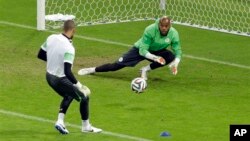Fans around the world have been enjoying a flurry of goals at the World Cup in Brazil but with the tournament now in its knockout phase it is goalkeepers, not strikers, who have been grabbing most of the headlines.
In a tournament that well exceeded the 145 goals scored before the quarter-final stage in South Africa in 2010, goalkeepers have stolen the limelight with a string of scintillating performances.
Indicative of their quality is the fact that when Algeria lost 2-1 against Germany in extra-time, it was the Desert Fox's keeper Rais Mbolhi who was man of the match despite his team's elimination.
Until Germany scored their first goal early in extra-time, Mbolhi had single-handedly denied the three-time champions again and again, frustrating them with superb saves to give the North Africans hope until the very end.
In the same game Germany keeper Manuel Neuer provided a blueprint of the future with a masterclass of goalkeeping, rushing out of the box for much of the game to act as a sweeper while his leaking defense was caught napping.
Neuer played down his performance after the game. “I always play like that, and at Bayern Munich I also play like that."
But looking at the heatmap of his positions during the match, Neuer, who used to be an in-field player as a young boy and tries to get in on the action in training as much as possible, spent much of his time outside his box.
He even hit a top speed of 22.4 kmh as he outsprinted Algerian forward in his half.
So it no real surprise that in the eighth round of 16 games, five man-of-the-matches awards went to goalkeepers.
Young guns
Apart from Neuer, some of the World Cup heavyweights failed to live up to expectations, including Spain's Iker Casillas and Russia's Igor Akinfeev.
Instead it was lesser-known keepers who stole the show with Mexico's Guillermo Ochoa, currently without a club, frustrating hosts Brazil in their 0-0 draw to help his country reach the knockout stage.
There he proceeded to deny the Dutch repeatedly before finally being beaten twice in the dying minutes but still did enough to win the man-of-the-match award in both those games.
Costa Rica's Keylor Navas was even more successful at soaking up Greece's pressure in the round of 16, doing everything right for about an hour when his team was down to ten men.
Then he stepped up to the plate again in extra-time with the Greeks pouring forward as if sensing that if it came to penalties Navas would again deliver.
He did exactly that, saving a spot kick in the ensuing shoot-out to send the Central Americans into the last eight and the Greeks heaping praise on the man who denied them what would have been a memorable qualification.
Navas, who plays for Levante in Spain but now has big clubs circling to sign him, has several training tricks up his sleeve.
One of them is saving tennis balls, shot at his goal at a speed of 160 km per hour by Spain Davis Cup player Pablo Andujar from a distance of 20 meters to improve reflexes.
USA keeper Tim Howard was also showered with compliments for making 16 stops against Belgium when his team buckled under the Europeans' pressure.
He was the only reason they managed to go into extra time before losing 2-1, with Howard earning hugs and pats on the back from the Belgians at the end of the game.
His saves were the most ever seen by a goalkeeper in a World Cup since 1966, according to FIFA, world soccer's governing body.
No fluttering
One of the reasons for these performances is no doubt the lower altitude of where game are played compared to South Africa and the ball hardly fluttering, especially from long range shots.
Keepers at the 2010 tournament complained even before the World Cup started that the official ball used in combination with the high altitude made it near impossible to judge its track as it twisted and turned past them.
Another obvious reason is that defenses at this tournament are far more open, with play flowing back and forth.
Looking at both Italy and Germany, their defenses at this tournament are only a pale shadow of their once granite-like backlines.
Spain's tiki-taka game of possession that reduced speed to a snail's pace is also out of fashion, making open play in Brazil look like a racing car compared to South Africa.
Even 2010 black sheep, Julio Cesar, has been transformed into a hero.
The Brazil keeper, vilified after his mistakes led to their 2010 elimination by the Netherlands, made a game-changing save in their round of 16 match against Chile.
He then proceeded to save two spot kicks in the shootout, answering the prayers of an entire nation as he kept the hosts dreams of a sixth World Cup very much alive.
Click here to check our our special World Cup site






